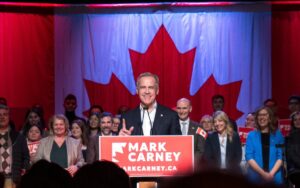
The NDP has regularly defended, propped up, and even partnered with Liberal governments which many people believe represent globalist and elitist interests rather than those of everyday working families. Photo Credit: iStock.
Meet Joe, a life-long resident of Beaumont, a small town near Edmonton, Alberta. Joe works for a major Canadian oil production company and is a member of a union. His wife, Brooke, is a piano teacher who operates her studio out of their home. The couple are practicing Roman Catholics who attend church regularly and have enrolled their children at the local Catholic school. They both drive used cars. On the weekends, when Joe is not taking the kids to the hockey rink or riding stable, he enjoys maintaining the family property, and occasionally goes fishing or hunting. Each year, the family organizes a community Easter egg hunt, goes camping in the summer, carves pumpkins in the fall and cuts down their own Christmas tree.
Determining the federal political party that would most resonate with Brooke and Joe would depend largely on the era in which they live(d). While the New Democratic Party (NDP) positions itself as the eternal home of Canadian workers, some of the most celebrated accomplishments of organized labour took place prior to the birth of the Co-operative Commonwealth Federation (CCF), the predecessor of the NDP. Perhaps even more significantly, an increasing swath of traditional NDP backers are finding that the party has grown out of touch with their values, and in many cases, believe that it is no longer representing their interests.
With our nation on the cusp of a federal campaign, now is a good time to recount the history of Canadian labour politics. An in-depth examination will provide some answers about which party Canadian workers are most likely to back in 2025.
The first piece of historic Canadian labour legislation to be enacted was the Trade Unions Act of 1872. This pivotal statute was passed by a Conservative government, which was led by Sir John A. Macdonald. The Trade Unions Act afforded workers the right to collectively organise, become members of unions and engage in legal strike action. Prior to 1872, union involvement was illegal. With these new found protections, however, workers were empowered to effectively fight for better wages, fairer hours and safer working conditions. The Liberal Party, at the time, was strongly opposed to unionisation, and actively worked against the budding labour movement through the remainder of the 19th century. The dawn of the 20th century, however, saw a dramatic change in their approach.
Liberal Prime Minister Wilfrid Laurier is not always remembered for being a strong advocate of the labour movement. However, he did establish the Department of Labour in 1900, and in 1909, he appointed William Lyon Mackenzie King as the first Canadian Labour Minister. King only held his post for two years before losing his House of Commons seat when the Conservatives returned to power in 1911. Nonetheless, Laurier’s creation of a cabinet portfolio for industrial relations went a long way to convalescing the Liberal brand from a long-standing reputation of working-class hostility. When King became Liberal leader himself, he identified the Labour movement as an immense potential voting bloc. Therefore, throughout his Premierships in the 1920s, 30s and 40s, King passed unprecedented legal protections for workers and unions, including the Canada Labour Code (1944), established an extensive social safety net and sought to ensure that labour relations news and court proceedings were given adequate press coverage.
All in all, King was successful in flipping the script on the Conservatives. However, many workers interpreted the actions of both parties as insincere and insufficient. With this sentiment in mind, the Cooperative Commonwealth Federation was formed in 1932 under the leadership of James Shaver Woodsworth. Woodsworth was a devout Methodist who believed that meeting the material as well as the spiritual needs of people was necessary for fulfilling the high calling of the Christian Gospel. The CCF (re-named NDP in 1961) became a strong force in federal and provincial politics, advocating dignity and respect for workers, caring for the poor and destitute as well as protecting the most vulnerable in society, always anchored in Christian values. These principles were championed in Ottawa by Woodsworth, and later by Saskatchewan Premier Tommy Douglas, another man of faith, who partnered with Conservative and Liberal federal governments to establish a publicly funded health care system for all Canadians.
The concluding decades of the 20th century brought trying times for the labour movement. Pierre Trudeau sold himself as a man of the people during his formative years. As Prime Minister, however, he often sided with elite business and government interests rather than common folk. Brian Mulroney was familiar with the plight of working people better than most Prime Ministers, coming from a modest background himself, and being a labour attorney by profession. However, he was compelled by forces much greater than any single world leader to embrace free-trade and globalisation. Subsequent governments, led by Jean Chrétien and Paul Martin, oversaw the offshoring of manufacturing jobs and the rising dominance of multinational corporations. Simultaneously, the NDP went through a period of fundamental change.
The 2003 NDP leadership election was a referendum to decide the direction of the party for a new century. One of the top candidates vying for the job was Bill Blaikie, a United Church Minister and experienced Member of Parliament, who was committed to the Christian heritage of the labour movement, as well as its rural roots and traditional interests. Blaikie was opposed by Jack Layton, a Toronto City Councillor, who campaigned on a vision that was urban and secular. Ultimately, Layton won a strong mandate, and transformed the party into his own image.
Layton is credited with modernising the NDP to compete with the Liberals for progressive votership. He accomplished this objective by abandoning a platform of Christian compassion in favour of far-reaching environmental activism, agnostic social values and other policies that prioritise the needs of big cities over small towns. Over time, Layton experienced success, and eventually achieved official opposition status in 2011. In following this path, however, Layton and his successors have gradually eroded much of their traditional voting base. Moreover, the religious undergirding of the party is giving way to Marxist perspectives.
Over the past twenty years, people like our aforementioned friends, Joe and Brooke, have watched in perplexity as the so-called “party of working women and men” has advocated to shut down Canadian energy industries which employ hundreds of thousands of people while supporting consumer carbon taxes. The party has centred its economic platform as well as its social policy and housing plans around the latest urban fads. Perhaps most strikingly, however, the NDP has regularly defended, propped up, and even partnered with Liberal governments which many people believe represent globalist and elitist interests rather than those of everyday working families.
The tides of change are rising and the NDP is unlikely to alter course. The 2025 election is coming like a freight train which is poised to culminate a seismic shift in voter demographics that began during the Premiership of Stephen Harper. We are anticipating a metamorphosis that will see the Conservative Party of Canada, with policies and leadership that speak to grassroots Canadians like Brooke and Joe, become the new home of Canada’s labour machine.
The NDP may soon fade into peripherality, but if the Liberals would like to compete for the labour vote again in the future, they will need to overhaul their policy frameworks and present a relevant vision which regular people can understand. Despite his status as an academic elitist, Mark Carney may have the best chance of pulling it off. If he is to be successful, however, his first order of business will be rethinking how he holds his beer.

Nick Redekop completed his Honours Bachelor of Arts Degree in Labour Studies at Brock University. He has previously served in municipal and federal politics. In his free time, Nick enjoys following sports, taking part in outdoor activities, and reading biographies. Nick resides in Niagara Falls



















